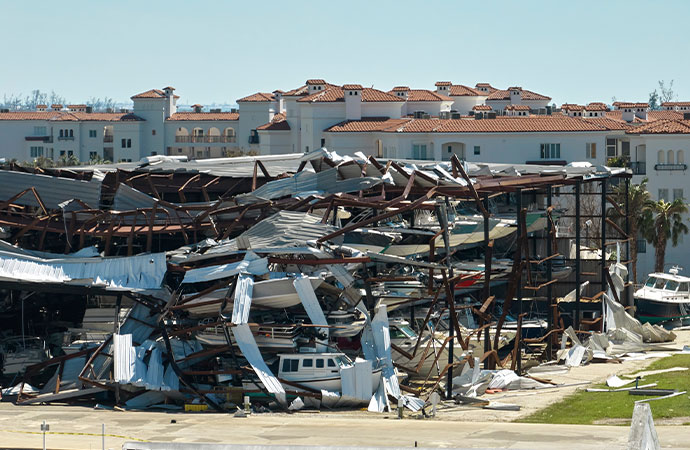Disaster Preparation Guide for Your Business
The statistics are sobering. After a disaster, 40% of small businesses won’t reopen, and 25% of those that do reopen will fail within a year. Within three years of a disaster, 75% of small businesses without a continuity plan will fail. If you want your business to survive any kind of disaster, you need to be prepared. Here are some tips and guidelines to help you get your business ready.
Assess Risk

Before starting your disaster plan, it’s important to assess the individual risks for your business. This will help you determine which disasters are most important for you to prepare for.
In general, the biggest risk in the Coeur d’Alene and Post Falls area is for fire, which is considered moderate and affects about 80% of properties. The odds of strong windstorms in the area are minimal, and flooding risk is minor.
However, it’s important to pay attention to your property’s individual flooding risk. The risk of flooding affects about 7% of commercial properties in Coeur d’Alene and 8% in Post Falls. While that’s a low overall risk, for the affected properties, the danger is very real.
Not sure how to assess your property’s individual risks? A good place to start is with your insurance company. They likely know the risk level of your property for various disasters. It’s good to touch base with them, anyway, because disaster preparation may be able to lower your insurance rates if you take their recommended steps. They may also recommend relevant coverage, such as business interruption insurance. They can even refer you to reliable commercial restoration services.
Make a Plan
Once you know what types of disaster are likely to affect your business, you can make a plan to address your vulnerability to each type of disaster. FEMA (Federal Emergency Management Agency) recommends planning in six dimensions:
- Staff
- Surroundings
- Space
- Systems
- Structure
- Service
Prepare your staff by creating business continuity plans and crisis communication plans, including designating specific employees to handle continuity and communication during a disaster.
Your plan should take into account your specific surroundings. For example, if you’re addressing flood risk, determine if you should install floodwalls and/or levees. For a fire plan, consider whether you need a fire break around your building.
For the space assessment, you should assess the risks related to the contents of your space, including chemicals stored on your property. For flooding purposes, move critical contents at least one foot above the expected flood level, and make sure all chemicals are stored safely so their contents won’t leak into floodwaters. For fire, store critical contents in fireproof containers and store flammable chemicals to mitigate risks. For other contents that are likely vulnerable to disaster, assess whether it’s cost-effective to protect them or if content restoration is a better option.
Make sure all systems, including mechanical, electrical, and water systems, are prepared to handle the risks. Understand the storm risks to your power supply, and how much backup power you require.
Assess the resistance of your structure to flooding, fire, and other risks. Remove landscaping that puts your property at risk, such as loose objects that can become dangerous in the event of a high windstorm, and upgrade building materials to improve resilience if recommended.
For service, make sure your plan includes both how to maintain continuity during and following a disaster as well as ways that your business can help your community during a disaster.
Prepare to Execute Your Plan
Next, you need to prepare to execute your plan. Train your staff in their responsibilities during a disaster, and run drills to make sure everyone knows what to do and is capable of doing it. Sometimes it makes sense for the same person to be designated in the event of any disaster, but other times it makes sense to have different people responsible in the event of a fire or severe storm, for example.
Stock up on supplies necessary to your disaster plans. Store these in a remote location if necessary to protect them in the event of a disaster.
Reach out to a disaster restoration partner. In the event of a large-scale disaster, commercial restoration services are likely to be in high demand, and forming a relationship now can save you from calling around during that rush. This not only avoids hassle, but it can also save valuable time that will improve the odds of recovery for your business. It may even reduce your costs for commercial restoration services.
Let Burke’s Restoration Help Your Business Prepare
At Burke’s Restoration, we have helped businesses from Spokane Valley to Coeur d’Alene prepare for and recover from major disasters. This includes fire damage, flooding, and damage from major storms.
We encourage all businesses to take advantage of our Ready Action Plan (RAP) for disasters. With this plan, our team will:
- Protect your property before, during, and after a disaster
- Improve your reaction time during disasters
- Prepare information about your building in photos and videos
- Document the pre-disaster condition of your business
- Conduct maintenance and preparation activities
- Store your information in a secure cloud location
These business plans will make your business more resilient in the event of any disaster. It will save you money and improve the odds that your business will be able to navigate the disaster successfully, defying the odds for long-term survival.
Want to get started on your RAP? Do you want to arrange disaster restoration services? Contact Burke’s Restoration today for help getting your business ready before disaster strikes.





